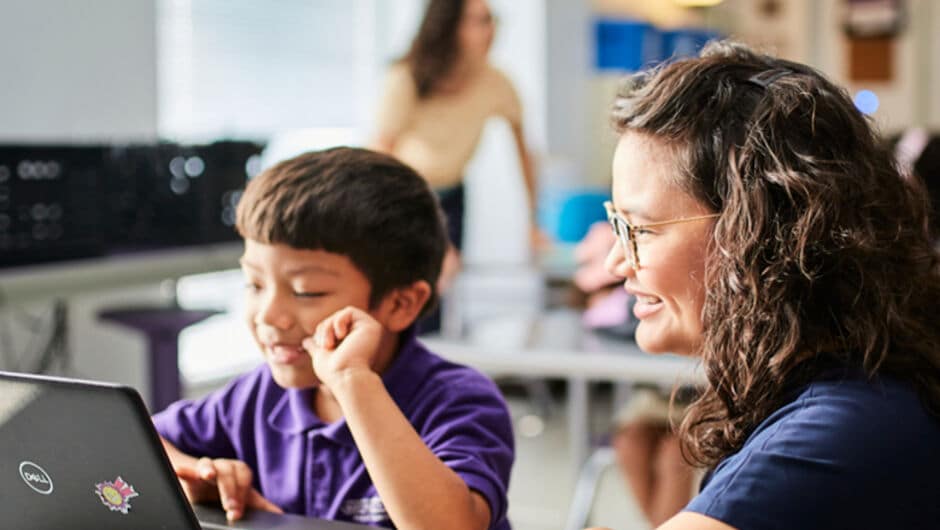
Looking Ahead to a New Corps
Facing a school year unlike any other, Teach For America is accelerating our work to reimagine corps member training.
Before schools closed in response to the COVID-19 pandemic, Teach For America CEO Elisa Villanueva Beard (Phoenix ’98) was working at highlighting the many unmet needs students have, and the systems-level change required to put all children on a path to economic mobility and a future filled with possibility.
The nature of that work changed quickly as the COVID-19 crisis shined a harsh light on long-standing systemic inequities. “We don’t want to go back to normal when it comes to education because so many children were being left behind in those systems, and this is a chance to imagine something different and better,” Elisa noted in May. She believes our country in this moment has an obligation to rethink education and reimagine what’s next. Teach For America’s role in developing leaders in this effort, she said, is more important than ever.
Those leaders have traditionally gotten their start at a summer teacher-training institute. With conditions this spring calling us to adjust to the new reality of social distancing, Teach For America accelerated its work-in-progress to standardize and move more of its corps training online. So for the first time since the organization’s founding 30 years ago, the summer portion of teacher training will be virtual, leading into intensive coaching of corps members as they begin teaching in regions across the country.
While planning was underway in May, Elisa shared more with One Day Magazine about the why, the how, and the ways that members of the incoming corps informed Teach For America’s work to reconstruct training and development for this moment and beyond.
How are you thinking about this next school year and the role of our incoming corps members?
This is such an unprecedented moment we are living through. TFA is grounded in an unwavering commitment to kids, and right now, the lives and education of millions of students have been so disrupted by school closings and the impact of the pandemic. It’s having a profound effect on kids, families, and teachers—especially in communities we work in, where the deep inequities were there long before this crisis. What comes next isn’t about going back to normal. We need to imagine something fundamentally different for our children. All of which makes this next school year so important.
Our students won’t be able to just resume school in the fall without extra support, not only to recover lost learning time, but to help them recover from the heavy personal toll this crisis is taking on them and their families. It’s why we are so focused on ensuring our new corps members—whose leadership in classrooms is needed now more than ever—are ready to teach in the fall, even in the face of all the uncertainties we’re living with.
That brings us to this summer. What will be different about how corps members will be trained?
Schools will be different next year in ways we can’t even imagine right now. We don’t yet know when they’ll reopen or what those first weeks or even months might look like. So more than ever, teachers will have to be nimble and innovative and ready to adapt to whatever the situation demands.
For us, that means we have to deliver on preparing corps members who are equipped to lead rigorous, supportive, and inclusive classrooms in every school and region where they teach. That’s our north star in this pioneering summer we’re launching.
But rather than approaching this solely as a response to a crisis, we see this as a push to live fully into the future of our work with corps members to drive student impact. That means ensuring clarity and consistency in the experience and impact every corps members will have, in order to deliver on the promise we make to children. It means centering on their needs to get training and support to succeed with their students.
We’ll have a scope and sequence for teacher development that’s the same for all corps members, no matter where in the country they’ll teach. We’ve been moving toward that standardized roadmap for a while, and I believe this will ensure a consistent experience and impact for our students.
So it’s all planned out?
Well, it’s all happening very quickly as we speak in May since we’re welcoming corps members to training in June. What I can say for certain is that corps members won’t be living together on a college campus or doing their training or student teaching in traditional ways. But they will be training together in a fully virtual experience in all sorts of sessions, including small group explorations of the regions where they’ll be teaching. And that will be step one in the intensive support and development they’ll continue to receive. After virtual training, corps members will engage with their regions who are partnering with districts to establish opportunities for virtual or in-person teaching practice ahead of the first day of school, as the trajectory of the pandemic allows.
Are we building a virtual training platform ourselves?
The Teaching Channel will be a key partner, providing us with an online learning platform where all the corps members will train and practice teaching and get feedback from their coaches. This is important because we’re preparing for a scenario where some teachers may not be in physical school buildings this fall.
We are also partnering with Springboard Collaborative. As part of this partnership, corps members will work directly with students and families to improve early reading skills and family engagement in literacy. This will be the first-time corps members will directly work with families during summer training and we are excited about that opportunity.
So going virtual is a big step, but here’s what won’t change. We have clear expectations for our corps members to build their leadership. We know relationships are central to any teacher’s success, and that will be central to our training. The current crisis is showing us what we’ve always known, which is how essential relationships with students and families are, whether teaching in person or through a computer screen. We’ll still expect corps members to engage in regular reflection on their values, their decisions, their actions, and their impact, and to cultivate self-awareness through a shared commitment to our mission and to diversity, equity, and inclusiveness.
How will corps members be able to engage with the communities where they’ll be teaching?
We know how essential this is, and each of our regional teams is partnering with districts and principals and organizations in their communities to create those meaningful connections. I’ll give two examples. Our Detroit team is running a three-week fall warm-up led by alumni in the Detroit area who taught at last summer’s training. And our Las Vegas team is planning eight days of community-specific programming between the end of virtual training and the opening of school that will focus on local history and the roots of educational inequity in Las Vegas, and that will give corps members five days to spend time with local students.
How is corps members coaching evolving?
We’re doubling down on the bridge between the end of the centralized summer training and the first 90 days of teaching. We’ll tailor training for each content area and for specific student populations such as culturally and linguistically diverse learners. And through the Teaching Channel, we’re also going to give corps members access to a curated set of high-quality curriculum options and instructional materials. As we speak, we’re exploring the feasibility of offering on-demand, online coaching from master teachers and alumni school leaders.
Then in their first 90 days of teaching, corps members will get intensive, regionalized coaching as we build that bridge from centralized training to the support and development corps members receive throughout their commitment. We’ll be doing all of this with an understanding that folks have gone through a lot these last few months, so we’ll make sure teachers have strong support for their mental and emotional health.
Who’s helping us design and implement this training approach?
What’s incredible is that at the same time we’re adapting, the rest of the country is also figuring things out. There are so many unknowns for schools, districts, and the entire system. But we do know that we can’t go back to what was happening before—what was considered normal in our education system was not serving our kids.
One of the first things we did this spring was to reach out to our newest corps members to see if they still wanted to teach through all this uncertainty. I talked to many of them myself, and while they’re disappointed they won’t be together this summer, what I heard was they’re more committed than ever that we have to do this.
So as soon as we made the decision to stand up a virtual training, we started hosting focus groups, we conducted surveys, and we held one-on-one interviews with more than 1,000 school leaders, principals, teachers, incoming corps members, alumni, current corps members, and members of our staff.
We also put together an advisory council that includes experts in several fields, including edtech, virtual instruction and learning, special education, instructional practice, and more. They bring expertise from organizations like Teaching Tolerance and EverFi, and from universities and school districts.
We’re also calling on 30 years of our own research on corps member effectiveness, not to mention insights from thousands of alumni leaders. All those things are helping us prepare not just for training this new corps, but reimagining our training and support in the long term.
One of the best things about institute was how corps members built relationships. Can that still happen?
I know exactly what you’re saying. I met my husband, Jeremy, when we both worked at institute in Houston back in 2001, and I have lifelong friends from my 1998 corps. So I know how close the connections forged at institute can be. And one thing that came through loud and clear when we spoke to our newest corps members was how much they were looking forward to learning together and building those bonds.
But this is also a group that’s steeped in virtual experiences. They’re very open to different ways of building community. They’re giving us a lot of grace because of this current situation, and we’re listening for what they need. They asked for a mix, including live and simultaneous learning which they’ll do with other corps members in learning communities of around 40-to-50 people. But we’re also giving flexibility in when and how they do some of their training, since they’re managing family commitments and the work-from-home juggle just like everyone.
These are very achievement-oriented people who want to be prepared for anything. I have no doubt they’re going to build the same bonds that kept all the rest of us going through our first year of teaching and for the long term. And I’m excited to see the energy and creativity they bring to this challenge.
More on Teach For America's Response to the Pandemic
Sign up to receive articles like this in your inbox!
Thanks for signing up!
Content is loading...






